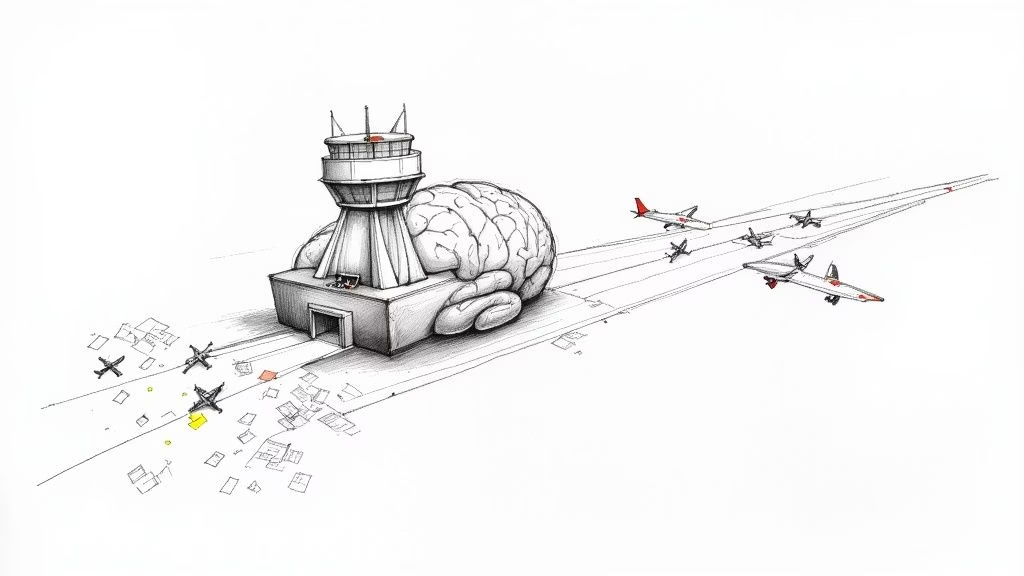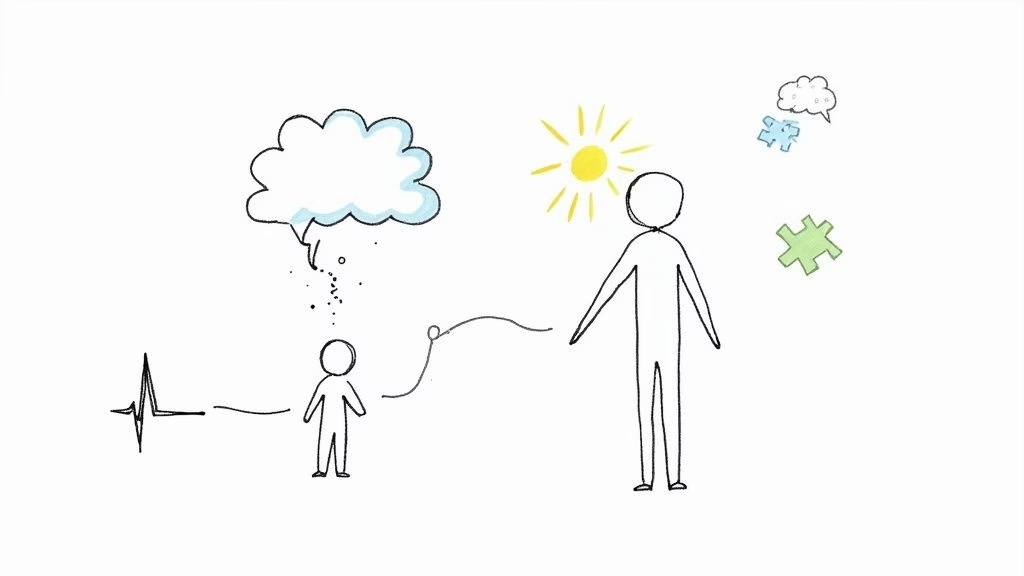It’s a frustrating term, isn't it? "Executive function disorder" isn't a formal diagnosis you'd find in a medical handbook, but it perfectly captures the real-world struggle with a core set of brain-based skills.
Think of it this way: these skills—like working memory, flexible thinking, and self-control—are what allow us to plan our day, stay focused on a task, and juggle multiple responsibilities without dropping all the balls. When these skills aren't firing on all cylinders, life can feel chaotic and overwhelming.
The Brain's Air Traffic Control System
Imagine your brain has an air traffic control tower. Its job is to manage all the incoming and outgoing flights—every thought, task, and impulse. This system helps you prioritize what needs to land first, filters out distracting "weather," and reroutes flights when the plan suddenly changes.
For someone struggling with executive functions, that control tower is understaffed and overwhelmed. Thoughts get stuck on the runway. Signals get crossed. Completed goals—the successful landings—are few and far between. This isn't about being lazy or unintelligent; it's a fundamental difference in how the brain is wired to manage information. The result is a constant battle with organization, time management, and emotional regulation that makes even simple tasks feel like climbing a mountain.
To get a clearer picture of what's going on under the hood, it helps to break these skills down into their core components. This infographic shows the three main pillars that support all of our executive abilities.
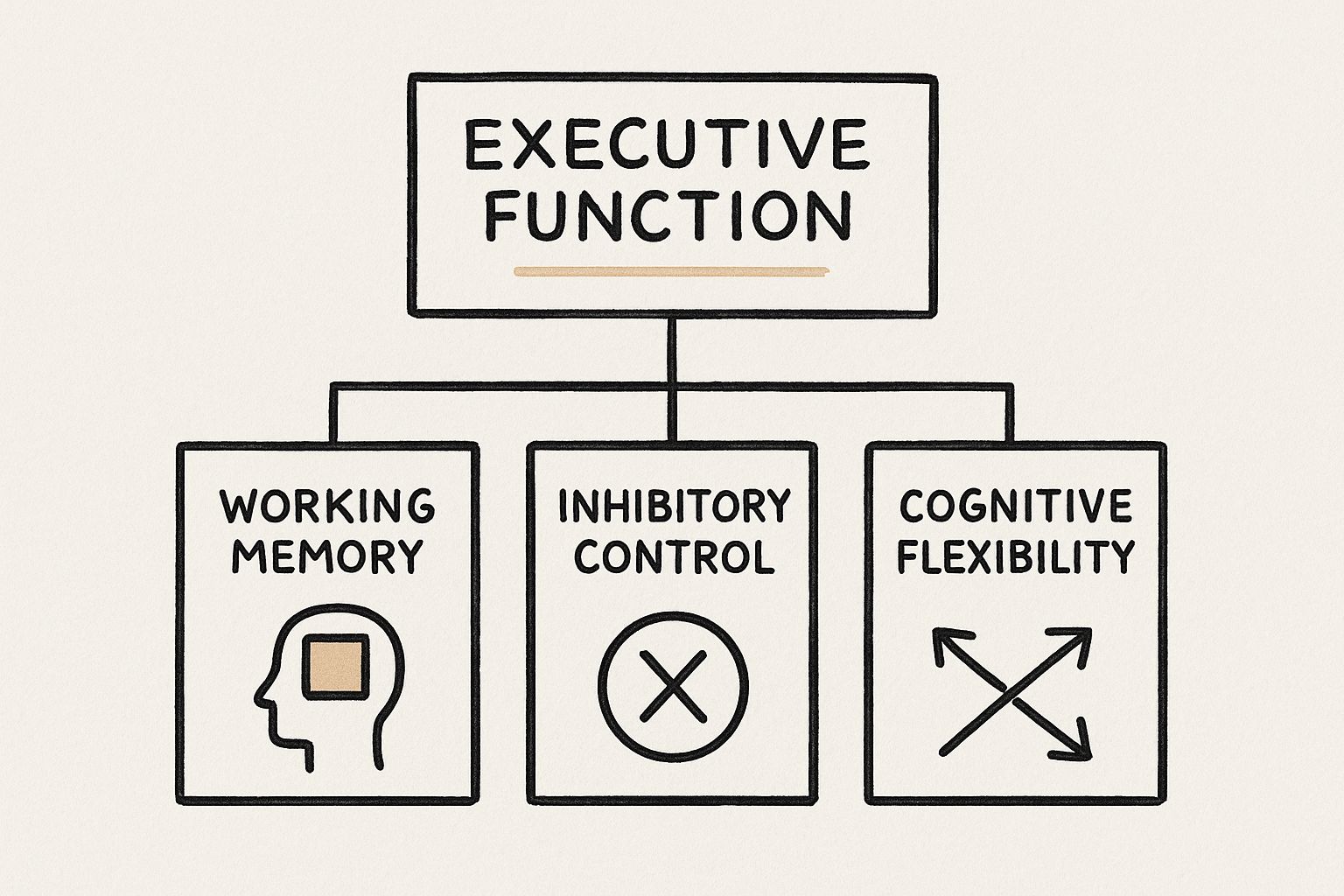
As you can see, working memory, inhibitory control, and cognitive flexibility are the foundational building blocks for higher-level skills like planning, organizing, and problem-solving. When the foundation is shaky, everything built on top of it becomes unstable.
Understanding the 8 Core Skills
While the "big three" are the foundation, they branch out into more specific skills we use every single day. Getting familiar with them can help you pinpoint exactly where the challenges lie.
Here's a quick look at the eight core executive function skills and what they actually mean in practice.
| Executive Function Skill | What It Looks Like in Daily Life |
|---|---|
| Impulse Control | Thinking before you act or speak; resisting the urge to do something you might regret later. |
| Emotional Control | Managing feelings appropriately; not letting frustration or disappointment derail you. |
| Flexible Thinking | Adapting to unexpected changes; seeing a problem from different angles. |
| Working Memory | Holding information in your mind while you use it, like remembering instructions or a phone number. |
| Self-Monitoring | Being aware of your own performance and how your actions affect others. |
| Planning & Prioritizing | Creating a roadmap to reach a goal; deciding what's most important to do first. |
| Task Initiation | The ability to just start something without procrastinating. |
| Organization | Keeping track of information, belongings, and schedules in a systematic way. |
Recognizing these individual skills is the first step. It shifts the focus from a vague sense of "I can't get anything done" to a more specific understanding, like, "I really struggle with task initiation and planning."
The Strong Link to ADHD
It's almost impossible to talk about executive function without mentioning Attention-Deficit Hyperactivity Disorder (ADHD). The overlap is huge. In fact, many experts consider ADHD to be, at its core, a disorder of executive function.
This isn't just a small-scale issue. It's estimated that symptomatic adult ADHD affected over 366 million adults globally in 2020. For teens and young adults, the frustration of not being able to start homework, control an emotional outburst, or remember a deadline often stems directly from these cognitive wiring differences.
For more information on this connection, this article on What Is ADHD: Symptoms and Treatment is a great resource. Understanding how these conditions intertwine is a critical first step for any parent trying to figure out the best way to support their teen.
Why School and Motivation Feel So Impossible
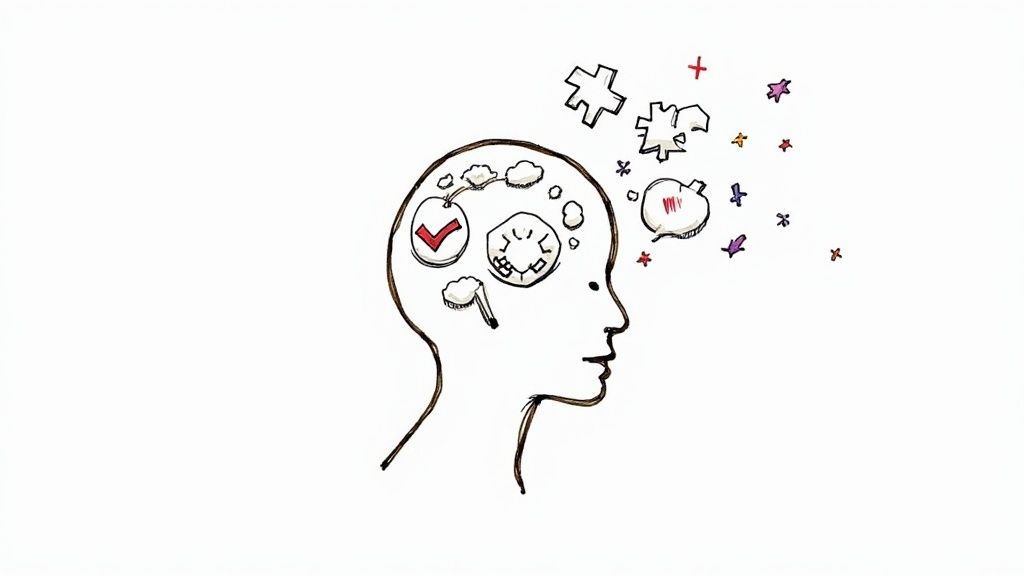
It’s one of the most maddening situations for a parent and teen: you have a bright, totally capable kid who just seems frozen when it's time to do schoolwork. They'll stare at a blank screen for hours, unable to start an essay. They’ll promise they’re going to tackle that big project, but the deadline sails by with nothing to show for it.
This isn’t about being lazy or defiant. More often than not, it's a direct outcome of an executive function disorder. The demands of school—with its multi-step assignments, long-term deadlines, and abstract thinking—create a perfect storm for a brain that has trouble with planning, getting started, and staying organized.
When a teen can’t get their homework started, that's a breakdown in task initiation. When they know the due dates but still miss them, it's a battle with time management and organization. And when that huge research paper feels so massive they just shut down, it’s a deficit in planning and prioritizing.
The Hidden Emotional Toll
The academic fallout is easy to see—grades drop, assignments are missed, and parent-teacher conferences become a source of dread. But what’s often invisible is the emotional cost, which is far more damaging. Constantly feeling like you're failing, letting people down, and not living up to your own potential is a heavy weight to carry.
This cycle can absolutely crush a teen’s self-esteem. They start to internalize the struggle, telling themselves they're lazy, stupid, or just broken. For teen boys, who are often taught to hide any sign of vulnerability, this frustration can come out as anger, withdrawal, or a complete shutdown. This makes it even harder for parents to figure out what’s really going on beneath the surface.
This isn't a character flaw. It's a mismatch between how a brain is wired and the rigid expectations of the academic world. Seeing it this way is the first step toward finding solutions that actually work.
Understanding this mismatch changes everything. It moves the conversation from a place of judgment ("Why won't you just do it?") to one of collaboration ("How can we break this down so it feels manageable for your brain?"). To dig deeper into this, check out our guide on why you have no motivation.
Practical Parenting Tips for School Struggles
When you’re supporting a teen with executive function challenges, your role has to shift from critic to coach. The goal isn't to do the work for them, but to provide the external structure they need to start building those skills for themselves.
- Become the "External Brain": Use visual tools. Think whiteboards, planners, and simple checklists. Break every assignment down into ridiculously small, concrete steps. Instead of "Work on your history paper," try "1. Choose topic," "2. Find three sources," and "3. Write the first paragraph."
- Focus on Starting, Not Finishing: Procrastination is almost always about the anxiety of getting started. Set a timer for just 15 minutes of focused work. The only goal is to begin. That’s it.
- Collaborate on a System: Don’t just impose a system on them. Work with your teen to design a way to organize their backpack and desk. What works for you might not click for them. Giving them ownership of the process makes them far more likely to actually use it.
- Embrace Imperfection: Perfectionism is a major driver of procrastination. Let your teen know that a "good enough" first draft is far better than a "perfect" one that never gets written. The goal is progress, not perfection.
Resources for Teen Boys and Young Men
For a lot of teen boys and young men, the pressure to have it all together without showing weakness is incredibly isolating. It's crucial they find a community where they can be open without fear of judgment. Organizations like The Man Cave or Evryman create supportive spaces for young men to navigate challenges with the help of mentorship and peers. These men's groups help tear down the toxic idea that asking for help is a sign of failure.
On top of that, a simple mindfulness practice can be a game-changer. A guided meditation, even for just five minutes a day, helps build the mental muscle for focus and dials down the anxiety that fuels procrastination. There are tons of free apps and online resources out there built specifically for teens to make it feel less like a chore and more like a tool.
Recognizing the Signs in Teens and Young Men
Figuring out if a teenager is struggling with executive function isn't about checking boxes on a generic list. It’s about recognizing a pattern that shows up in the real world—in their messy rooms, their chaotic school bags, and their intense emotional reactions.
These aren't signs of a bad attitude or a character flaw. They are signals from a brain that is genuinely struggling to keep up with the demands of daily life.
For parents, this means learning to see these behaviors through a completely new lens. The forgotten permission slip isn’t defiance; it’s a breakdown in working memory. The emotional outburst over a seemingly small setback isn't just teenage drama; it's a deficit in emotional control. Understanding what’s really going on shifts the dynamic from frustration and conflict to empathy and support.
Signs of Executive Dysfunction At Home vs At School
These challenges often look different depending on the environment. At school, the highly structured day can sometimes mask the difficulties, while the unstructured freedom at home can let them run wild. In other cases, the constant demands of school can highlight issues that are less obvious at home.
The key is to look for persistent patterns, not just isolated incidents. Here’s a comparison of how these struggles often appear in both settings.
| Challenge Area | Signs at Home | Signs at School |
|---|---|---|
| Task Initiation | Struggles to start chores without constant reminders; puts off simple tasks like taking out the trash for hours. | Stares at a blank page for most of the class period, unable to begin an essay or assignment. |
| Organization | A perpetually messy room where clean clothes are mixed with dirty; frequently loses keys, phone, or wallet. | A disorganized backpack where papers are crumpled and lost; consistently forgets necessary books or materials. |
| Emotional Control | Has disproportionately angry or frustrated reactions to minor problems; shuts down or withdraws when feeling overwhelmed. | Gets easily frustrated with difficult problems and may give up quickly; overreacts to peer feedback or criticism. |
| Time Management | Grossly underestimates how long tasks will take; is always running late, even with plenty of time to prepare. | Misses deadlines despite knowing about them for weeks; rushes through work at the last minute, leading to poor quality. |
Recognizing these patterns across different areas of your teen's life is the first step. It shows that this isn't about laziness—it's about a consistent, underlying challenge.
The Unique Struggles for Teen Boys
For many teen boys, the internal frustration of an executive function disorder often comes out in ways that get completely misunderstood. There's so much societal pressure on them to appear strong and in control, which can make it incredibly difficult to admit they're struggling or ask for help.
Instead of saying, "I'm overwhelmed," a teen boy might:
- Get Angry: Lashing out can be a defense mechanism. It pushes people away and masks the underlying feelings of incompetence and anxiety.
- Withdraw Completely: Shutting down and retreating to video games or isolation can feel way safer than facing another potential failure.
- Adopt a "Don't Care" Attitude: If you pretend you don't care about your grades or responsibilities, then you can't be hurt when you fail to meet them. It's a shield.
These behaviors are often a form of self-protection. The anger and withdrawal are symptoms of the core problem—a brain struggling to keep up—not the problem itself. It's a critical distinction for parents to make.
This is why understanding teen boys' mental health and the need for real-world mentorship is so important. Giving them a supportive, non-judgmental space to build skills is crucial.
Parenting Tips for Identifying the Real Issue
As a parent, your role isn't to be a disciplinarian, but a compassionate detective. Your job is to look for the "why" behind the behavior.
- Observe Without Judgment: For just one week, simply observe. Write down the specific challenges you see without attaching labels like "lazy" or "irresponsible." Instead of "He's so lazy," write "He struggled to start his homework for 45 minutes."
- Ask Open-Ended Questions: Ditch the "Why didn't you do your homework?" and try something like, "It seems like getting started on that assignment was tough. What did that feel like?" This opens the door for a conversation, not an argument.
- Look for the Pattern: Is this a one-time thing, or does your son consistently struggle with planning long-term projects? Does he forget his cleats for practice every other week? Patterns point to a skills deficit, not a character flaw.
By shifting your perspective, you can begin to see these challenges for what they truly are—clear signs that your teen needs support, not criticism.
Actionable Strategies for Parents and Teens
Knowing why your teen is struggling with executive functions is one thing, but figuring out how to help is another. When a teen’s internal "air traffic control system" is overloaded, the best thing you can do is help them build an external one. This means shifting your role from a frustrated manager to a supportive coach.
It’s not about doing the work for them. It’s about giving them the structure and tools they need to build their own skills. Small, consistent actions can help your teen get back on track, build confidence, and cut down on the daily friction that executive function challenges create.
Create an External Brain
One of the most powerful things you can do is help your teen build external systems that do the heavy lifting their brain is struggling with. Think of these tools as a visible, tangible "brain" that offloads the mental work of remembering, planning, and staying organized.
This approach takes all the overwhelming demands floating around in their head and puts them out in the open where they're easier to manage. You're creating an environment designed for success.
Here are a few key tools:
- Visual Calendars and Whiteboards: Get a large calendar and put it somewhere central, like the kitchen. Use it to track every deadline, appointment, and chore. This gets the dates out of their head and gives everyone a clear picture of what’s coming up.
- Digital and Physical Checklists: A simple checklist is a game-changer for multi-step tasks like homework assignments or even the morning routine. "Clean your room" feels huge. But breaking it down into "1. Put clothes in hamper, 2. Make bed, 3. Take out trash" makes it feel doable.
- Dedicated Workspaces: A quiet, organized study spot is non-negotiable. This means no phones, no video games, no distractions. This space sends a clear signal to the brain: when I’m here, it’s time to focus.
Master the Art of Scaffolding
Think about the scaffolding on a building. It's a temporary support that lets workers build something they couldn't reach otherwise. You can apply the exact same principle to schoolwork and chores. Scaffolding is all about breaking huge, intimidating projects down into ridiculously small, achievable steps.
This is the perfect antidote to the paralysis that often comes with executive function disorder, especially for those tasks they keep putting off.
The whole idea is to forget the massive finished project and focus only on the very next tiny step. Celebrating each small completion builds the momentum they need to keep going.
So, instead of a task like "write the history essay," the scaffold would look like this:
- Choose a topic.
- Find three credible sources online.
- Write just the thesis statement.
- Create a simple outline with three main points.
- Write the first body paragraph.
Each one of these is a small win, making the whole project feel possible. If you want to dive deeper, there are some great resources out there with more effective executive function disorder strategies.
A Simple Meditation Guide for Teens
Mindfulness and meditation are incredible tools for strengthening the brain's "control center." A regular practice can sharpen focus, dial down impulsivity, and ease the anxiety that so often fuels procrastination.
Here’s a simple five-minute guide to get your teen started:
- Find a Quiet Spot: Sit in a chair, feet flat on the floor, hands resting in your lap. Get comfortable.
- Set a Timer: Put five minutes on a timer. That way, you’re not wondering how much time is left.
- Focus on Your Breath: Close your eyes and just notice your breath. Feel the air come in through your nose, fill your lungs, and then leave your body.
- Acknowledge Distractions: Your mind is going to wander. That’s totally normal. When a thought pops up, just notice it without judging it and gently guide your focus back to your breath.
- Finish with Intention: When the timer goes off, slowly open your eyes. Take a second to notice how you feel.
This isn’t about trying to empty your mind. It's about practicing the skill of coming back to focus, over and over. That’s what builds the mental muscle for attention and self-control.
Building Resilience and Finding Mental Health Resources
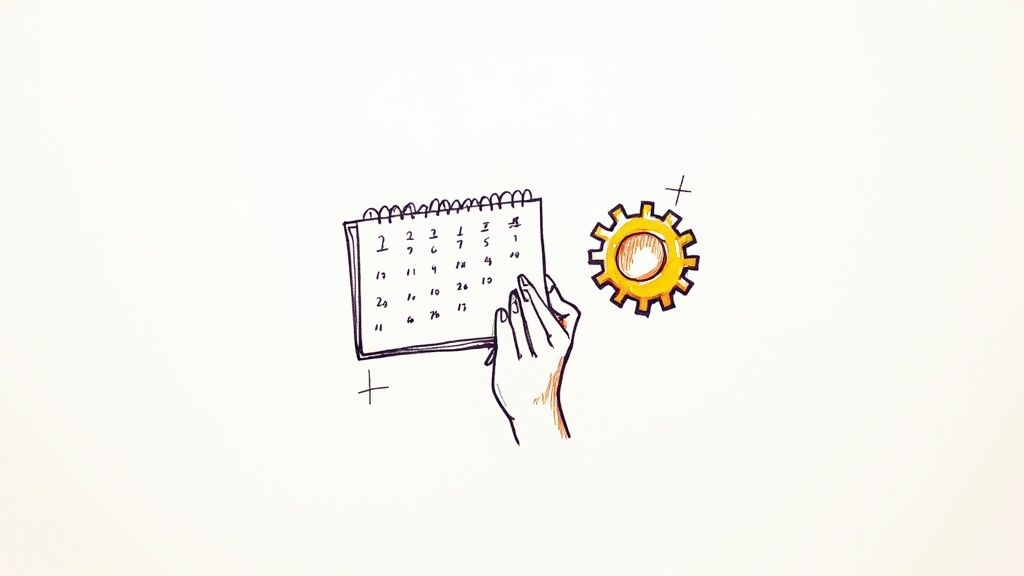
Dealing with an executive function disorder isn’t just about getting better at using planners or checklists. It’s about building the mental and emotional strength to handle the inevitable frustrations and setbacks that come with it. The constant battle with motivation, schoolwork, and procrastination can really take a toll on a teen's mental health.
This is especially true for teen boys and young men, who often feel the societal pressure to just "tough it out" on their own. The right support can show them they’re not alone and make it okay to ask for help. A solid support system isn’t just one thing; it’s a mix of personal habits, communities that get it, and practical tools.
The connection between executive function challenges and mental health is huge. It's estimated that nearly 20% of kids and adolescents worldwide are affected by a mental health disorder. Conditions like major depressive disorder, which almost always involves struggles with planning and motivation, are a leading cause of disability. It’s a clear sign that finding good mental health resources is more important than ever. You can learn more about these global mental health statistics from a 2023 study.
Supportive Communities for Young Men
For many teen boys, the hardest part of the struggle is feeling like they’re the only one going through it. Connecting with others who understand what it’s like can be a game-changer, breaking down that sense of isolation. Luckily, there are some great organizations creating safe spaces for young men to talk openly.
Finding a community where you can be vulnerable without fear of judgment is not a sign of weakness—it's a sign of strength. It's about finding your team.
Here are a few places to start:
- The Man Cave: An awesome organization focused on facilitating conversations around healthy masculinity and mental health for boys and young men.
- Evryman: This group runs men's groups and retreats designed to help guys connect with their emotions and build real, supportive relationships.
- HeadsUpGuys: A resource built specifically to help men manage and prevent depression, offering practical advice and stories from guys who've been there.
These communities are working to dismantle the toxic idea that "real men" don't ask for help.
Essential Resources for Teens and Parents
Beyond finding a community, there are plenty of digital tools and organizations that can offer immediate support for both teens and their parents.
Top-Rated Apps for Organization and Focus:
- Todoist: A simple but incredibly effective to-do list app that helps you break down big, overwhelming projects into small, manageable steps.
- Forest: This app makes focusing into a game. You plant a virtual tree that grows as long as you stay on task. If you leave the app to get distracted by your phone, the tree dies.
Teen Mental Health Non-Profits:
- The Jed Foundation (JED): A leading non-profit dedicated to protecting the emotional health of teens and young adults and preventing suicide.
- The Trevor Project: Provides life-saving crisis intervention and suicide prevention services to LGBTQ young people under 25.
These resources are a great starting point for building a strong web of support. By combining personal practices like meditation, the backing of a good community, and practical tools, teens can develop the resilience they need to not just cope with an executive function disorder, but to truly thrive.
When to Seek Professional Support

While the strategies we've covered can make a huge difference, sometimes the challenges feel too big to tackle alone. Is your family stuck in a constant loop of arguments over schoolwork, motivation, and missed deadlines? If so, it might be time to bring in a professional.
This isn't a sign of failure—far from it. It's a proactive step toward getting your teen the specialized support they need to finally get unstuck and start thriving.
So, when is the right time to reach out? A good rule of thumb is when these struggles start chipping away at your teen’s self-esteem, damaging family relationships, or putting their academic future at risk. A professional assessment can cut through the confusion and give you a clear path forward.
What to Expect From an Assessment
The first step is typically a neuropsychological evaluation. This isn't just one test; it's a series of assessments run by a psychologist or educational specialist. The goal is to create a detailed map of your teen’s cognitive landscape—pinpointing their unique strengths and the specific executive functions that are causing friction.
This evaluation is invaluable. It helps distinguish executive function challenges from other conditions and gets to the root cause of why they're struggling with motivation and school performance.
It’s important to remember that executive dysfunction shows up in a wide range of conditions, from autism and traumatic brain injuries to simple sleep deprivation. For example, its incidence after a stroke can be as high as 75%. Understanding this complexity is key. You can find more insights on the many conditions linked to executive dysfunction on MedLink.
Finding the Right Support for Your Teen
Once you have a clear picture from an assessment, you can explore support that’s actually built for your teen's needs. For many young men, the most powerful approach is a combination of therapy, coaching, and school-based accommodations.
-
Cognitive-Behavioral Therapy (CBT): This is a game-changer for helping teens reframe those destructive thought patterns like, "I'm just lazy," or "I can't do this." CBT gives them practical tools to manage the anxiety and procrastination that so often come with executive function challenges.
-
Executive Function Coaching: Think of a coach as a guide and an accountability partner rolled into one. They work directly with your teen to build personalized systems for organization, time management, and motivation that actually stick. A coach helps translate abstract goals into concrete, actionable steps. You can learn more about how executive function coaching can help your teen.
-
School Accommodations (IEPs or 504 Plans): If the evaluation points to a learning disability or a condition like ADHD, your teen may be eligible for an Individualized Education Program (IEP) or a 504 plan. These plans level the playing field by providing accommodations like extended time on tests, help with note-taking, or preferential seating. It's not about making things easier; it's about giving your teen a fair shot to show what they truly know.
Still Have Questions? Let's Clear Things Up
When you're trying to understand executive function challenges, a lot of questions come up. It's a confusing topic, and it's easy to fall back on old myths. Here are some of the most common questions I hear from parents and teens, along with some straight answers.
Is My Teen Just Being Lazy?
Absolutely not. This is probably the biggest misconception out there, and it’s a painful one. Laziness is a choice to not put in the effort. Executive function disorder is a real, brain-based struggle that makes it incredibly difficult to get started, stay organized, and follow through on tasks.
I can't tell you how many teens I've worked with who desperately want to do well but feel completely stuck. They’re overwhelmed by the "how," not the "why."
Will They Just Grow Out of It?
The brain keeps maturing well into our mid-20s, so there's a lot of growth still to come. But a person doesn't just "outgrow" significant executive function deficits any more than you'd outgrow being left-handed. The future, however, is incredibly bright.
Through the right strategies, consistent coaching, and building solid habits, teens and young adults can create powerful systems to manage their challenges. They can, and do, go on to lead incredibly successful lives.
The goal isn't to "fix" the brain. It's about building a personalized toolkit of strategies that work with its unique wiring. This shift in perspective is what empowers a teen to finally take control.
If My Teen Struggles with This, Does It Automatically Mean They Have ADHD?
Not necessarily. While executive function disorder is a core feature of ADHD, it's not the only cause. These same challenges can show up with autism, anxiety, depression, learning disabilities, or even after a brain injury.
There's a lot of overlap, which is why a professional evaluation is the only way to get a clear picture of what's going on and find the right path forward.
If you see your teen getting lost in procrastination, battling with motivation, and feeling totally overwhelmed by school, it's time to get them the right kind of support. Andrew Petrillo Life Coaching provides one-on-one coaching designed to help teens and young men build the skills they need to not just get by, but to truly thrive.
Ready to help them turn that frustration into focus? Let's talk. You can schedule a complimentary discovery call to see how we can help.

















